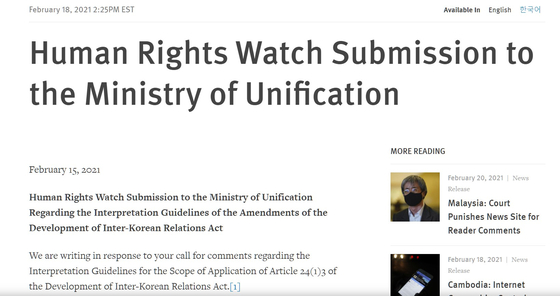Human Rights Watch (HRW), an international human rights organization, may infringe on the freedom of expression, saying, “The regulations are ambiguous enough to be set as prohibited items” regarding the guidelines for interpretation of the North Korean Warfare Act (Amendment Inter-Korean Relations Development Act) prepared by the Ministry of Unification. Said that

Human Rights Watch, an international human rights organization, said in an opinion letter sent to the Ministry of Unification on the 15th, fearing that the anti-North Korea wartime ban could excessively limit freedom of expression. Human Light Watch website
HRW, headquartered in New York, released the contents of the opinion it received from the Ministry of Unification on the 18th (local time) on its website on the 15th. HRW, first of all, “in accordance with the International Covenant on Civil and Political Rights (ICCPR) Restrictions on freedom of expression must be kept to a minimum, and even when governments restrict them by law, they must meet standards recognized as essential in a democratic society.“I pointed out.
Freedom restrictions for security, only when the whole country is at risk
In addition, Manfred Nowak, a human rights expert who served as a special investigator for UN advisors, said in a commentary, “Restricting freedom of expression to protect national security is allowed only when the entire country is faced with serious political or military threats.”Restrictions for national security reasons could potentially undermine the entire freedom of expression, so particularly stringent conditions should be laid down.‘
Accordingly, HRW expressed concern that the guidelines for interpreting the anti-shear method could broadly limit freedom of expression. It is that the laws and regulations on prohibited items punished when sent to North Korea are not specific.
Actual law prohibits the spread of’shears, etc.’ “The term’flyer, etc.’ refers to flyers, articles (including advertising and propaganda materials, printed matters, auxiliary memory devices, etc.), money or other property interests.”Are doing. HRW was concerned that the expression’back’ could include a wide range of items. In particular, he pointed out that the provision of property interests can be interpreted broadly as “applicable to any item.”
“It is outside the scope of the Panmunjom Declaration Agreement”
HRW feared that the penalties for imprisonment of up to three years or fines of up to 30 million won were excessive. The law also does not explain why it intends to impose relatively heavy punitive measures instead of civil or administrative measures.

Rep. Tae Young-ho, the power of the people, speaks at a press conference held in December last year in front of the Constitutional Court in Jongno-gu, Seoul, hosted by civic groups such as a meeting of lawyers for human rights and reunification on the Korean Peninsula. yunhap news
HRW also wrote about the Panmunjom Declaration based on the government’s grounds, “The only agreement between the two Koreas is to stop broadcasting loudspeakers and to stop spreading flyers in the area around the military demarcation line, but the law imposes restrictions beyond that.”
As domestic and international criticism that the anti-shear law excessively restricts the freedom of expression was stiff, the Ministry of Unification recently prepared and released guidelines for interpretation. The intention was that the spreading of leaflets in third countries was not regulated by the leaflet law. However, there is no specific content of’flyers, etc.’ It does not mean any interpretation of the concern about the violation of the constitutional rule of prohibition of excess, which stems from the fact that the government can arbitrarily regulate any behavior.
There is no explanation of interpretation guidelines,’flyers, etc.’
Since the government prohibits the spread of flyers, etc. only in the case of’a threat to the public’s safety’, the freedom of expression is limited to a minimum, and therefore there is no big problem. Unification Minister Lee In-young said at a conference inviting the Seoul Foreign Journalists’ Club (SFCC) on the 3rd, “Despite this law is a very clear law without an enforcement decree, the Ministry of Unification is planning to create a guideline for interpretation that corresponds to a kind of bylaws in February.” . The law was so clear that there was no need for an enforcement decree, but because of the misunderstandings, the interpretation was created.

Unification Minister Lee In-young is holding an invitation meeting for the Seoul Foreign Journalist Club at the press center in Jung-gu, Seoul on the 3rd. News 1
However, as the government judges entirely whether it poses a threat to the safety of the public, that is, whether or not to ban it, concerns about the violation of freedom of expression are bound to continue. Accordingly, there are criticisms that the government started legislation by prioritizing the improvement of inter-Korean relations without a big awareness of the universal value of the restriction of freedom of expression.
Reporter Yoo Ji-hye [email protected]
